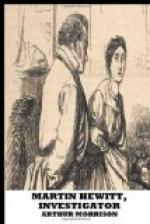To my dying day I shall never forget that three miles. They seemed three hundred. In the still country almost every footfall seemed audible for any distance, and in the long stretches of road one could see half a mile behind or before. Hewitt was cool and patient, but I got into a fever of worry, excitement, want of breath, and back-ache. At first, for a little, the road zig-zagged, and then the chase was comparatively easy. We waited behind one bend till Wilks had passed the next, and then hurried in his trail, treading in the dustiest parts of the road or on the side grass, when there was any, to deaden the sound of our steps.
At the last of these short bends we looked ahead and saw a long, white stretch of road with the dark form of Wilks a couple of hundred yards in front. It would never do to let him get to the end of this great stretch before following, as he might turn off at some branch road out of sight and be lost. So we jumped the hedge and scuttled along as we best might on the other side, with backs bent, and our feet often many inches deep in wet clay. We had to make continual stoppages to listen and peep out, and on one occasion, happening, incautiously, to stand erect, looking after him, I was much startled to see Wilks, with his face toward me, gazing down the road. I ducked like lightning, and, fortunately, he seemed not to have observed me, but went on as before. He had probably heard some slight noise, but looked straight along the road for its explanation, instead of over the hedge. At hilly parts of the road there was extreme difficulty; indeed, on approaching a rise it was usually necessary to lie down under the hedge till Wilks had passed the top, since from the higher ground he could have seen us easily. This improved neither my clothes, my comfort, nor my temper. Luckily we never encountered the difficulty of a long and high wall, but once we were nearly betrayed by a man who shouted to order us off his field.
At last we saw, just ahead, the square tower of an old church, set about with thick trees. Opposite this Wilks paused, looked irresolutely up and down the road, and then went on. We crossed the road, availed ourselves of the opposite hedge, and followed. The village was to be seen some three or four hundred yards farther along the road, and toward it Wilks sauntered slowly. Before he actually reached the houses he stopped and turned back.
“The churchyard!” exclaimed Hewitt, under his breath. “Lie close and let him pass.”
Wilks reached the churchyard gate, and again looked irresolutely about him. At that moment a party of children, who had been playing among the graves, came chattering and laughing toward and out of the gate, and Wilks walked hastily away again, this time in the opposite direction.
“That’s the place, clearly,” Hewitt said. “We must slip across quietly, as soon as he’s far enough down the road. Now!”
We hurried stealthily across, through the gate, and into the churchyard, where Hewitt threw his blue spectacles away. It was now nearly eight in the evening, and the sun was setting. Once again Wilks approached the gate, and did not enter, because a laborer passed at the time. Then he came back and slipped through.




